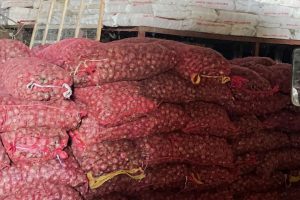P5-billion fund to address gaps in food supply deemed ‘too small’
THE P5-billion fund designed to plug gaps in the food supply could be inadequate for addressing shortages of key commodities and may be left begging for money with rice cornering the funding, analysts said. Fermin D. Adriano, a former Agriculture undersecretary, said in a Viber message that the Department of Agriculture’s (DA) allocation is dwarfed […]

THE P5-billion fund designed to plug gaps in the food supply could be inadequate for addressing shortages of key commodities and may be left begging for money with rice cornering the funding, analysts said.
Fermin D. Adriano, a former Agriculture undersecretary, said in a Viber message that the Department of Agriculture’s (DA) allocation is dwarfed by the funding for other commodities.
Mr. Adriano noted that the government’s allocation is much larger for the National Food Authority (NFA), the agency whose task is to maintain a reserve of rice in cases of national emergencies.
Funding will also be an issue, judging from the expected allocation of rice tariffs.
Last week, Congress released a bicameral conference committee report for proposed amendments to the Rice Tariffication Law of 2019 or RA No. 11203. The amendments include about P15 billion in funding for rice procurement and P5 billion for a food security buffer fund for emergencies.
“Based on the amendments the P5 billion will come from excess tariff collections, so (there will be) no sure funding,” Federation of Free Farmers National Director Raul Q. Montemayor said via Viber.
Last week, Agriculture Secretary Francisco P. Tiu Laurel, Jr. said that the DA is looking at various funding sources to operationalize the purchase and distribution of prime or basic commodities during shortages or price spikes.
Mr. Montemayor said that the DA would need to deal with storage and distribution costs of its stockpile.
“A lot of things still have to be sorted out,” he added.
Republic Act (RA) 7581, or the Price Act, authorizes a buffer fund and other measures to stabilize prices of basic commodities in calamity areas.
The Price Act empowers such a fund to procure, purchase, import, or stockpile any basic or prime commodity.
In a Department Circular, the DA said stockpiled commodities will be distributed for sale at a “reasonable price” to areas hit by shortages or where there is a need to influence changes in the prevailing prices in the area.
The volume of the commodities for stockpiling should not exceed 10 days of the average national food requirement, it said. — Adrian H. Halili












